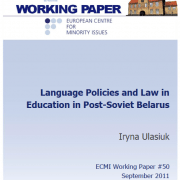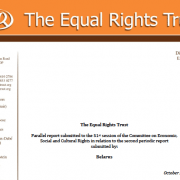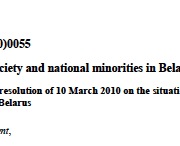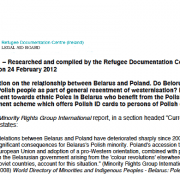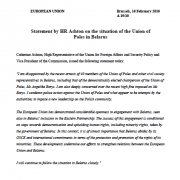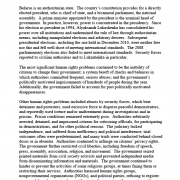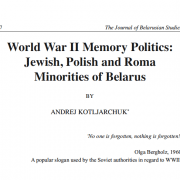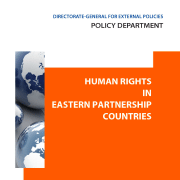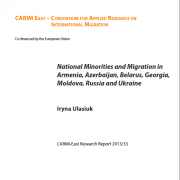The dissolution of the Soviet Union brought to the fore claims of linguistic minorities which had been ignored far too long. In almost all of the former Soviet republics language became an impetus to national revival and an important instrument in consolidating the newly independent states. At times excessively accentuated and overly politicized, the language […]
Read more
This parallel report focuses on the extent to which Belarus has met its obligations to respect, protect and fulfil the rights to equality and non-discrimination. The submission is concerned with Belarus’s performance under Article 2(2) of the International Covenant on Economic, Social and Cultural Rights, and with the impact which discrimination has on the enjoyment […]
Read more
This document is a European Parliament resolution of 10 March 2010 on the situation of civil society and national minorities in Belarus.
Read more
This article provides an overview of the sociolinguistic situation in Belarus. It summarizes language policy and legislation, and deals in more detail with language management and selected language problems in Belarusian education. It also contributes to the work on language planning by applying Jernudd’s and Neustupny’s Language Management Theory, particularly theconcept of the language management […]
Read more
This briefing tries to answer questions on Belarus-Poland relations (and the Polish minority in Belarus) through a compilation of extracts form reports. Do Belorussians resent Polish people as part of general resentment of westernisation? Is there resentment towards ethnic Poles in Belarus who benefit from the Polish government scheme which offers Polish ID cards to […]
Read more
This country report analyses the human rights violations in Belarus. It provides detailed information about such violations, classifying them by categories.
Read more
The aim of this study is to interpret recent trends in contemporary memory politics in Belarus, with focus on the Holocaust, Roma genocide memorials, and the memorial sites of the Polish minority in Belarus. It analysis contemporary Belarusian memory politics with respect to World War II, through the examination of the Soviet period.
Read more
This paper gives an account of the state of human rights and democratic institutions in the EaP countries and discusses the EU concepts and tools for human rights and democracy promotion in the region, including the proposals related to the May 2011 ENP Communication (ENPI Civil Society Facility, European Endowment for Democracy, etc.), as well […]
Read more
This paper intends to look at the interconnection of minority and migration issues.It aims to investigate the interrelation of the minority regimes adopted by Armenia, Azerbaijan, Belarus, Georgia, Moldova, Russia and Ukraine, and migration. It seeks to open up the discussion on the extent to which certain policies and rights for national minorities can be […]
Read more

